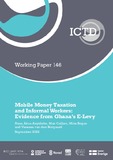| dc.contributor.author | Anyidoho, Nana Akua | |
| dc.contributor.author | Gallien, Max | |
| dc.contributor.author | Rogan, Mike | |
| dc.contributor.author | van den Boogaard, Vanessa | |
| dc.coverage.spatial | Ghana | en |
| dc.date.accessioned | 2022-09-08T14:59:31Z | |
| dc.date.available | 2022-09-08T14:59:31Z | |
| dc.date.issued | 2022-09 | |
| dc.identifier.citation | Anyidoho, N.A.; Gallien, M.; Rogan, M. and van den Boogaard, V. (2022) 'Mobile Money Taxation and Informal Workers: Evidence from Ghana’s E-Levy', ICTD Working Paper 146, Brighton: Institute of Development Studies, DOI:10.19088/ICTD.2022.012 | en |
| dc.identifier.uri | https://opendocs.ids.ac.uk/opendocs/handle/20.500.12413/17625 | |
| dc.description.abstract | The use of digital financial services, including money transfers and mobile money, have
expanded widely in lower-income countries in the past decade; 47 per cent of the population
of sub-Saharan Africa (548 million) had a registered mobile money account in 2020, with 29
per cent of those accounts representing active users (Andersson-Manjang and Naghavi
2021: 8). Among lower-income countries for which data is available, the average number of
mobile money accounts is more than double the number of commercial bank accounts. In
many lower-middle-income countries, mobile money usage is the same or more than
commercial bank usage (Bazarbash et al. 2020). Alongside this growth, governments have increasingly sought to tax DFS, rooted in deeper discussions about the role that technology can play in increasing tax revenue and strengthening overall state capacity (Fan et al. 2020; Okunogbe and Santoro 2021). While capturing revenue from DFS can come from many sources, mobile money taxes in particular have often been introduced due to the untapped revenue potential and the relatively
convenient and easy nature of the tax handle (Lees and Akol 2021a) – particularly in relation
to, say, corporate income taxes on financial service providers. As noted above, the search
for revenue is often closely linked to a desire to capture revenue from workers in the informal
economy, who are often framed as tax evaders. | en |
| dc.language.iso | en | en |
| dc.publisher | Institute of Development Studies | en |
| dc.relation.ispartofseries | ICTD Working Paper;146 | |
| dc.rights.uri | http://creativecommons.org/licenses/by/4.0/ | en |
| dc.subject | Finance | en |
| dc.subject | Work and Labour | en |
| dc.title | Mobile Money Taxation and Informal Workers: Evidence from Ghana’s E-Levy | en |
| dc.type | Series paper (non-IDS) | en |
| dc.rights.holder | © Institute of Development Studies 2022 | en |
| dc.identifier.doi | 10.19088/ICTD.2022.012 | |
| rioxxterms.funder | Default funder | en |
| rioxxterms.identifier.project | Default project | en |
| rioxxterms.version | VoR | en |
| rioxxterms.versionofrecord | 10.19088/ICTD.2022.012 | en |
| rioxxterms.funder.project | 9ce4e4dc-26e9-4d78-96e9-15e4dcac0642 | en |


